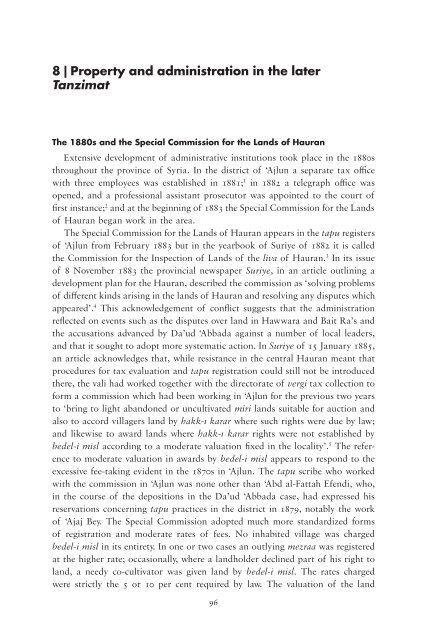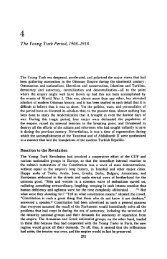Governing property, making the modern state - PSI424
Governing property, making the modern state - PSI424
Governing property, making the modern state - PSI424
You also want an ePaper? Increase the reach of your titles
YUMPU automatically turns print PDFs into web optimized ePapers that Google loves.
8 | Property and administration in <strong>the</strong> later<br />
Tanzimat<br />
The 1880s and <strong>the</strong> Special Commission for <strong>the</strong> Lands of Hauran<br />
Extensive development of administrative institutions took place in <strong>the</strong> 1880s<br />
throughout <strong>the</strong> province of Syria. In <strong>the</strong> district of ‘Ajlun a separate tax office<br />
with three employees was established in 1881; 1 in 1882 a telegraph office was<br />
opened, and a professional assistant prosecutor was appointed to <strong>the</strong> court of<br />
first instance; 2 and at <strong>the</strong> beginning of 1883 <strong>the</strong> Special Commission for <strong>the</strong> Lands<br />
of Hauran began work in <strong>the</strong> area.<br />
The Special Commission for <strong>the</strong> Lands of Hauran appears in <strong>the</strong> tapu registers<br />
of ‘Ajlun from February 1883 but in <strong>the</strong> yearbook of Suriye of 1882 it is called<br />
<strong>the</strong> Commission for <strong>the</strong> Inspection of Lands of <strong>the</strong> liva of Hauran. 3 In its issue<br />
of 8 November 1883 <strong>the</strong> provincial newspaper Suriye, in an article outlining a<br />
development plan for <strong>the</strong> Hauran, described <strong>the</strong> commission as ‘solving problems<br />
of different kinds arising in <strong>the</strong> lands of Hauran and resolving any disputes which<br />
appeared’. 4 This acknowledgement of conflict suggests that <strong>the</strong> administration<br />
reflected on events such as <strong>the</strong> disputes over land in Hawwara and Bait Ra’s and<br />
<strong>the</strong> accusations advanced by Da’ud ‘Abbada against a number of local leaders,<br />
and that it sought to adopt more systematic action. In Suriye of 15 January 1885,<br />
an article acknowledges that, while resistance in <strong>the</strong> central Hauran meant that<br />
procedures for tax evaluation and tapu registration could still not be introduced<br />
<strong>the</strong>re, <strong>the</strong> vali had worked toge<strong>the</strong>r with <strong>the</strong> directorate of vergi tax collection to<br />
form a commission which had been working in ‘Ajlun for <strong>the</strong> previous two years<br />
to ‘bring to light abandoned or uncultivated miri lands suitable for auction and<br />
also to accord villagers land by hakk-ı karar where such rights were due by law;<br />
and likewise to award lands where hakk-ı karar rights were not established by<br />
bedel-i misl according to a moderate valuation fixed in <strong>the</strong> locality’. 5 The reference<br />
to moderate valuation in awards by bedel-i misl appears to respond to <strong>the</strong><br />
excessive fee-taking evident in <strong>the</strong> 1870s in ‘Ajlun. The tapu scribe who worked<br />
with <strong>the</strong> commission in ‘Ajlun was none o<strong>the</strong>r than ‘Abd al-Fattah Efendi, who,<br />
in <strong>the</strong> course of <strong>the</strong> depositions in <strong>the</strong> Da’ud ‘Abbada case, had expressed his<br />
reservations concerning tapu practices in <strong>the</strong> district in 1879, notably <strong>the</strong> work<br />
of ‘Ajaj Bey. The Special Commission adopted much more standardized forms<br />
of registration and moderate rates of fees. No inhabited village was charged<br />
bedel-i misl in its entirety. In one or two cases an outlying mezraa was registered<br />
at <strong>the</strong> higher rate; occasionally, where a landholder declined part of his right to<br />
land, a needy co-cultivator was given land by bedel-i misl. The rates charged<br />
were strictly <strong>the</strong> 5 or 10 per cent required by law. The valuation of <strong>the</strong> land<br />
96












